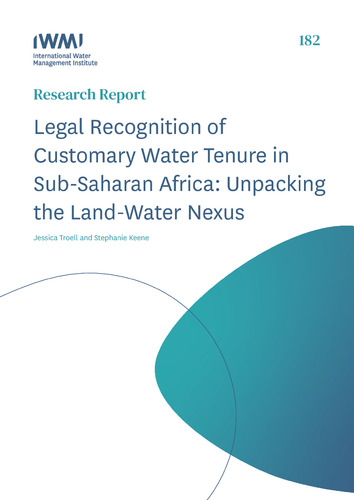Legal recognition of customary water tenure in Sub-Saharan Africa: unpacking the land-water nexus
Abstract
Despite the progress made in conceptualizing and advocating for secure community-based land and forest tenure rights, there is a critical lacuna in advocacy and policymaking processes pertaining to community-based freshwater tenure rights. Moreover, water tenure as a concept has only recently gained significant traction in global policy circles. This report analyzes national and international legal pathways for recognizing customary forms of community-based freshwater tenure rights held by Indigenous Peoples and Local Communities (IPLCs) in sub-Saharan Africa. It employs a methodological framework and builds on an analysis of community-based water tenure systems that was developed and applied by the Rights and Resources Initiative (RRI) and the Environmental Law Institute (ELI) in the publication Whose Water? A Comparative Analysis of National Laws and Regulations Recognizing Indigenous Peoples’, Afro-Descendants’, and Local Communities’ Water Tenure. Based on the key findings of this analysis, in particular the frequent dependence of IPLCs’ legally recognized customary water tenure rights on their legally recognized land and/or forest rights, this report further analyzes national constitutions, national legislation governing water, land, forests, environmental protection and other related matters, international and national case law, and international and regional human rights laws, to explore how legal frameworks are recognizing and protecting customary water tenure rights across sub-Saharan Africa. The findings and recommendations provide a basis for analyzing the comparative effectiveness and potential drawbacks of these legal pathways for the recognition and protection of customary water tenure and ultimately for future work refining and improving legislation and assessing progress in its implementation and enforcement.

